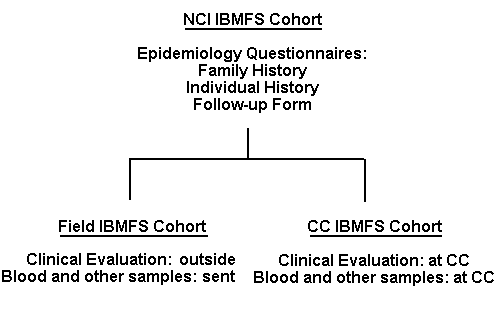How can I Participate and What can I Expect?
Individuals with one of the inherited
bone marrow failure syndromes,
and their parents, brothers, sisters, and children, are all invited
to participate. Those who come to the NIH Clinical Center (CC)
will belong to the "CC Cohort,"
and those who do not come will belong to the "Field Cohort."
 [D] [D]
Individuals who choose to participate in the NCI IBMFS
Cohort
will be asked to complete a family history questionnaire and an
individual information questionnaire. Physical examinations and
samples of blood, bone marrow (from those affected with the disorder),
and other tissues may be requested for research studies.
We encourage participants in this study to visit the NIH Clinical
Center, where we will offer comprehensive examinations by specialists,
laboratory tests, and age-appropriate cancer
screening tests. We also will collect information and blood samples
that we will need for the research portion of this study.
Because the purpose of this study is to identify the relation
between genes,
physical examination and laboratory findings, and the risk of
getting cancer, treatment is not being offered as
part of this project. We will discuss treatment and disease prevention
options with you and with your physicians (at your request). We
will also provide assistance in establishing care with appropriate
physicians if you are having difficulty identifying the proper
health care providers. We expect our study participants to remain
under the care of their regular doctors while they are participating
in our study. If emergency medical problems develop while you
are visiting the NIH Clinical Center as part of this study, we
will of course provide the care needed to deal with that emergency.
For a family to be considered eligible to participate in this
study, it must have one of the following:
- Someone in the family must have been diagnosed, currently
or previously, as having one of the named
Inherited Bone Marrow Failure Syndromes described on this Website,
or must have been told they had such a syndrome
without a specific name having been attached to it.
or
- Someone in the family must have had an abnormal chromosome
breakage test (the test for Fanconi’s anemia) using a DNA-damaging
agent such as diepoxybutane (DEB) or mitomycin C (MMC).
or
- Someone in the family must have had an abnormal red cell adenosine
deaminase (ADA) test (the test for Diamond
Blackfan anemia).
or
- Someone in the family must have/have had the clinical and
laboratory features typical for one of the known IBMFS (see
individual descriptions).
If my family participates at the NIH Clinical Center,
what will we receive?
- Evaluation of detailed personal medical history along with family
history of cancer.
- Complete physical examinations, blood and bone marrow studies,
x-ray/imaging tests, and age- and diagnosis-appropriate cancer
screening.
- Specialty consultations that are age- and diagnosis-appropriate,
including audiology (hearing tests), dentistry, dermatology (skin
examination), endocrinology (hormone studies), gastroenterology
(intestines), genetic counseling, gynecology, hepatology (liver
evaluation), neurology, ophthalmology (eye examination), otolaryngology
(ears, nose and throat examination), neuro-otology (nerve-related
hearing studies), physiatry (rehabilitation, physical medicine),
pulmonology (lung studies), social work, urology (kidneys, bladder,
prostate), and others as needed.
- Information regarding genetic test results, when possible, for
those who choose to learn their mutation status.
- Advice about the management of existing clinical problems and,
occasionally, information related to medical issues that may not
have been previously recognized.
- Education and advice regarding possible ways to reduce cancer risk.
- Results of clinical tests and cancer
screening evaluations, along with summary reports to primary care
physicians.
- Referral back to the primary physician or other consultants
at home for medical interventions based on results of tests performed
at the NIH.
- Reporting of scientific results at the end of the study, which
will also be shared with other physicians involved in the family’s
care, if the family so desires.
- Reimbursement for costs related to traveling to the NIH Clinical
Center.
If your family fits one of these descriptions, and you are interested
in contributing to the research on Cancer Susceptibility in Inherited Bone Marrow Failure Syndromes,
please call 1-800-518-8474 to speak with this study’s Research
Nurse, Lisa Leathwood or email her at LisaLeathwood@Westat.com.
She can answer your questions and provide further information
regarding CGB’s "Etiologic Investigation of Cancer Susceptibility
in Inherited Bone Marrow Failure Syndromes (IBMFS)" project.
The following link will take you to the description of the protocol:
http://clinicalstudies.info.nih.gov/detail/A_2002-C-0052.html.
|

